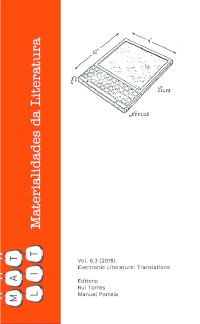Please use this identifier to cite or link to this item:
https://hdl.handle.net/10316.2/44385| DC Field | Value | Language |
|---|---|---|
| dc.contributor.author | Velički, Vladimira | - |
| dc.contributor.author | Velički, Damir | - |
| dc.date.accessioned | 2018-10-24T10:12:15Z | |
| dc.date.accessioned | 2020-10-04T00:49:42Z | - |
| dc.date.available | 2018-10-24T10:12:15Z | |
| dc.date.available | 2020-10-04T00:49:42Z | - |
| dc.date.issued | 2018 | - |
| dc.identifier.issn | 2182-8830 | - |
| dc.identifier.uri | https://hdl.handle.net/10316.2/44385 | - |
| dc.description.abstract | O hipertexto é adequado para levar a cabo experiências literárias, na medida em que desconstrói a sequência temporal da narração e diminui a autoridade do autor. O autor de hiperficção, de alguma forma, perde o controlo sobre como a sua obra influencia o leitor. Por outro lado, a crença de que o/a leitor/a de hiperficção é, ao mesmo tempo, seu/sua autor/a, pois escolhe o caminho para percorrer o texto, as ligações a reter e, dessa maneira, cria um novo texto, pode ser questionada. Utilizando como base quer as versões em rede, quer versões não conectadas em rede de alguns contos dos irmãos Grimm, este artigo apresenta os resultados de um estudo realizado com o objetivo de determinar se e como as obras de hiperficção mudam as formas de leitura, ou mesmo de pensar, ou se, pelo contrário, os modos tradicionais de pensar e de ler, e sua sequencialidade (princípio, meio, fim) estão tão profundamente enraizados no nosso processamento que não podem ser alterados. | por |
| dc.description.abstract | Hypertext is suitable for conducting literary experiments. It deconstructs the temporal sequence of narration, and lessens the author’s authority. The author of hyperfiction, in some way, loses control over how his or her work influences the reader. On the other hand, the belief that the reader of hyperfiction is at the same time its author, for he or she chooses which way to navigate the text, which hyperlinks to mark and in this manner create a new text, can be challenged. Using as its basis the networked and the non-networked versions of some Grimms’ fairy tales, this paper presents the results of the study, which was conducted with the aim of determining whether and how works of hyper-fiction will change ways of reading, or even thinking, or, on the contrary, whether traditional ways of thinking and reading, and their sequence (beginning, middle, end) are so deeply rooted in our processing that they cannot be changed. | eng |
| dc.language.iso | eng | - |
| dc.publisher | Centro de Literatura Portuguesa | - |
| dc.publisher | Imprensa da Universidade de Coimbra | - |
| dc.rights | open access | - |
| dc.subject | hyperfiction | eng |
| dc.subject | reading; narration | eng |
| dc.subject | author | eng |
| dc.subject | Grimms’ fairy-tales | eng |
| dc.subject | hiperficção | por |
| dc.subject | leitura | por |
| dc.subject | narração | por |
| dc.subject | autor | por |
| dc.subject | contos dos irmãos Grimm | por |
| dc.title | Hyperfiction and reading, with examples of electronic processing of Grimms’ fairy tales | por |
| dc.type | article | - |
| uc.publication.collection | Matlit v. 6, nº 3 | - |
| uc.publication.firstPage | 115 | - |
| uc.publication.issue | 3 | - |
| uc.publication.lastPage | 128 | - |
| uc.publication.location | Coimbra | - |
| uc.publication.journalTitle | MATLIT: Materialidades da Literatura | - |
| uc.publication.volume | 6 | por |
| dc.identifier.doi | 10.14195/2182-8830_6-3_10 | - |
| uc.publication.orderno | 10 | - |
| uc.publication.area | Artes e Humanidades | - |
| uc.publication.manifest | https://dl.uc.pt/json/iiif/10316.2/44385/263720/manifest?manifest=/json/iiif/10316.2/44385/263720/manifest | - |
| uc.publication.thumbnail | https://dl.uc.pt/retrieve/12074765 | - |
| item.grantfulltext | open | - |
| item.fulltext | With Fulltext | - |
| Appears in Collections: | Matlit | |
Files in This Item:
| File | Description | Size | Format | |
|---|---|---|---|---|
| hyperfiction_and_reading.pdf | 691.64 kB | Adobe PDF |  |
Items in DSpace are protected by copyright, with all rights reserved, unless otherwise indicated.
